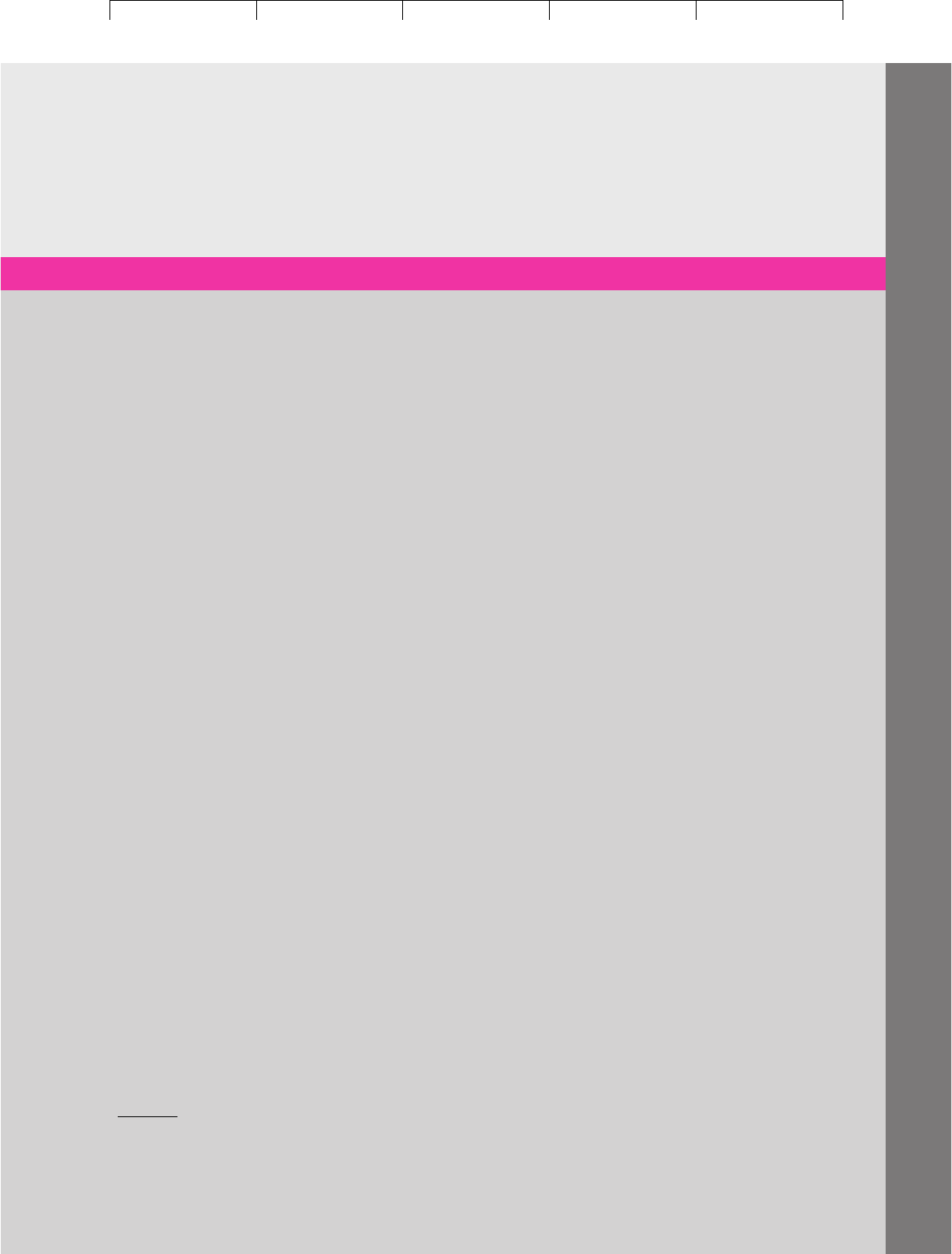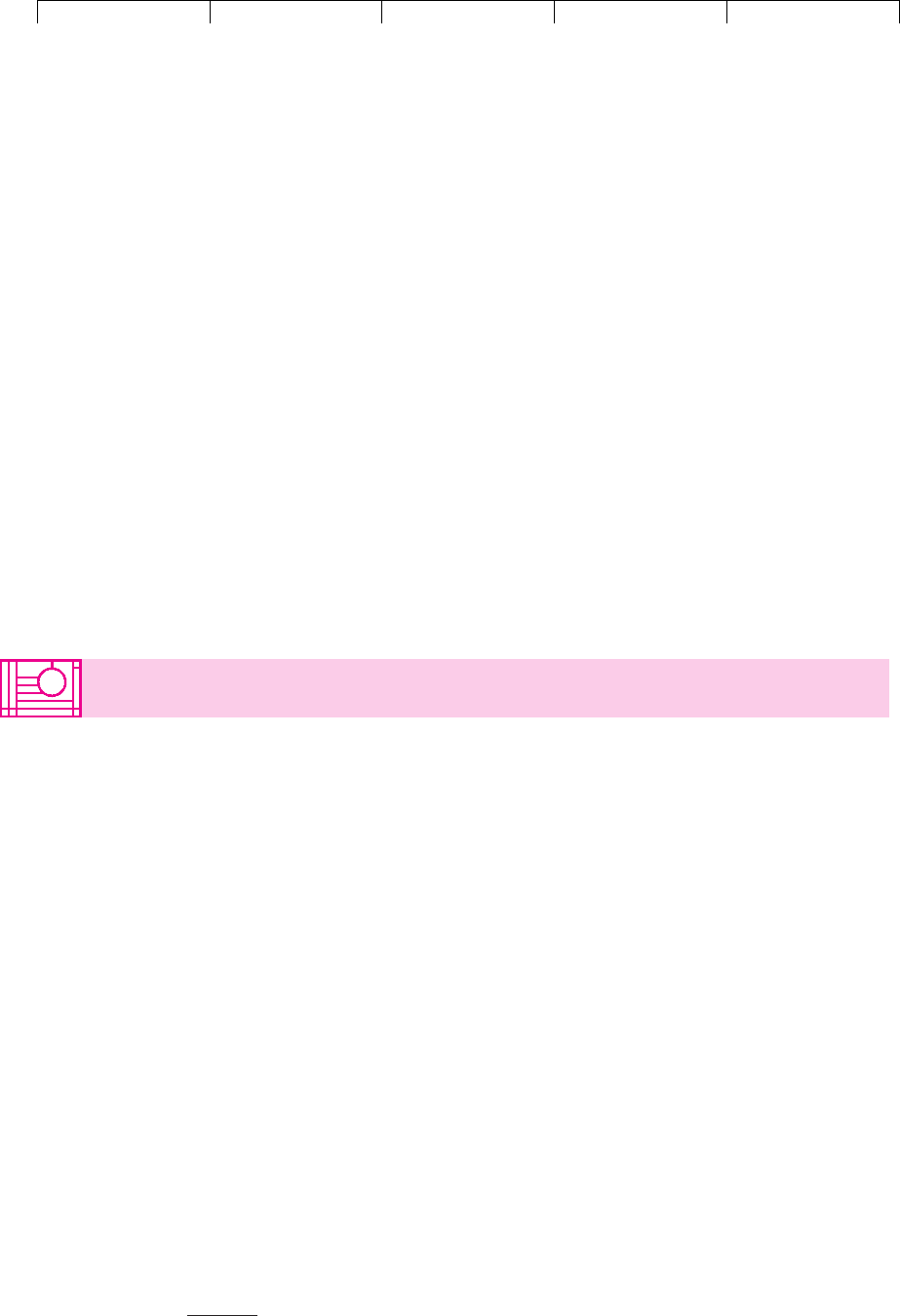Brealey, Myers. Principles of Corporate Finance. 7th edition
Подождите немного. Документ загружается.


Brealey−Meyers:
Principles of Corporate
Finance, Seventh Edition
III. Practical Problems in
Capital Budgeting
11. Where Positive Net
Present Values Come From
© The McGraw−Hill
Companies, 2003
CHAPTER 11 Where Positive Net Present Values Come From 309
Visit us at www.mhhe.com/bm7e
c. Would it now make sense to scrap existing plants when they are two rather than
three years old?
d. How would your answers change if the corporate income tax were abolished
entirely?
MINI-CASE
Ecsy-Cola
18
Libby Flannery, the regional manager of Ecsy-Cola, the international soft drinks empire, was
reviewing her investment plans for Central Asia. She had contemplated launching Ecsy-
Cola in the ex-Soviet republic of Inglistan in 2004. This would involve a capital outlay of $20
million in 2004 to build a bottling plant and set up a distribution system there. Fixed costs
(for manufacturing, distribution, and marketing) would then be $3 million per year from
2003 onward. This would be sufficient to make and sell 200 million liters per year—enough
for every man, woman, and child in Inglistan to drink four bottles per week! But there
would be few savings from building a smaller plant, and import tariffs and transport costs
in the region would keep all production within national borders.
The variable costs of production and distribution would be 12 cents per liter. Company
policy requires a rate of return of 25 percent in nominal dollar terms, after local taxes but be-
fore deducting any costs of financing. The sales revenue is forecasted to be 35 cents per liter.
Bottling plants last almost forever, and all unit costs and revenues were expected to re-
main constant in nominal terms. Tax would be payable at a rate of 30 percent, and under the
Inglistan corporate tax code, capital expenditures can be written off on a straight-line basis
over four years.
All these inputs were reasonably clear. But Ms. Flannery racked her brain trying to fore-
cast sales. Ecsy-Cola found that the “1-2-4” rule works in most new markets. Sales typically
double in the second year, double again in the third year, and after that remain roughly con-
stant. Libby’s best guess was that, if she went ahead immediately, initial sales in Inglistan
would be 12.5 million liters in 2005, ramping up to 50 million in 2007 and onward.
Ms. Flannery also worried whether it would be better to wait a year. The soft drink market
was developing rapidly in neighboring countries, and in a year’s time she should have a much
better idea whether Ecsy-Cola would be likely to catch on in Inglistan. If it didn’t catch on and
sales stalled below 20 million liters, a large investment probably would not be justified.
Ms. Flannery had assumed that Ecsy-Cola’s keen rival, Sparky-Cola, would not also enter
the market. But last week she received a shock when in the lobby of the Kapitaliste Hotel she
bumped into her opposite number at Sparky-Cola. Sparky-Cola would face costs similar to
Ecsy-Cola. How would Sparky-Cola respond if Ecsy-Cola entered the market? Would it de-
cide to enter also? If so, how would that affect the profitability of Ecsy-Cola’s project?
Ms. Flannery thought again about postponing investment for a year. Suppose Sparky-Cola
was interested in the Inglistan market. Would that favor delay or immediate action? Maybe
Ecsy-Cola should announce its plans before Sparky-Cola had a chance to develop its own pro-
posals. It seemed that the Inglistan project was becoming more complicated by the day.
Questions
1. Calculate the NPV of the proposed investment, using the inputs suggested in this case.
How sensitive is this NPV to future sales volume?
2. What are the pros and cons of waiting for a year before deciding whether to invest?
Hint: What happens if demand turns out high and Sparky-Cola also invests? What if
Ecsy-Cola invests right away and gains a one-year head start on Sparky-Cola?
18
We thank Anthony Neuberger for suggesting this topic.

Brealey−Meyers:
Principles of Corporate
Finance, Seventh Edition
III. Practical Problems in
Capital Budgeting
12.Making Sure Managers
Maximize NPV
© The McGraw−Hill
Companies, 2003
CHAPTER TWELVE
310
MAKING SURE
M A N A G E R S
MAXIMIZE NPV

Brealey−Meyers:
Principles of Corporate
Finance, Seventh Edition
III. Practical Problems in
Capital Budgeting
12.Making Sure Managers
Maximize NPV
© The McGraw−Hill
Companies, 2003
SO FAR WE’VE concentrated on criteria and procedures for identifying capital investments with posi-
tive NPVs. If a firm takes all (and only) positive-NPV projects, it maximizes the firm’s value. But do the
firm’s managers want to maximize value?
Managers have no special gene or chromosome that automatically aligns their personal interests
with outside investors’ financial objectives. So how do shareholders ensure that top managers do not
feather their own beds or grind their own axes? And how do top managers ensure that middle man-
agers and employees try as hard as they can to find positive-NPV projects?
Here we circle back to the principal–agent problems first raised in Chapters 1 and 2. Shareholders
are the ultimate principals; top managers are the stockholders’ agents. But middle managers and em-
ployees are in turn agents of top management. Thus senior managers, including the chief financial of-
ficer, are simultaneously agents vis-à-vis shareholders and principals vis-à-vis the rest of the firm. The
problem is to get everyone working together to maximize value.
This chapter summarizes how corporations grapple with that problem as they identify and commit
to capital investment projects. We start with basic facts and tradeoffs and end with difficult problems
in performance measurement. The main topics are as follows:
• Process: How companies develop plans and budgets for capital investments, how they au-
thorize specific projects, and how they check whether projects perform as promised.
• Information: Getting accurate information and good forecasts to decision makers.
• Incentives: Making sure managers and employees are rewarded appropriately when they add
value to the firm.
• Performance Measurement: You can’t reward value added unless you can measure it. Since
you get what you reward, and reward what you measure, you get what you measure. Make sure
you are measuring the right thing.
In each case we will summarize standard practice and warn against common mistakes. The section
on incentives probes more deeply into principal–agent relationships. The last two sections of the
chapter describe performance measures, including residual income and economic value added. We
also uncover the biases lurking in accounting rates of return. The pitfalls in measuring profitability are
serious but are not as widely recognized as they should be.
311
For most large firms, the investment process starts with preparation of an annual
capital budget, which is a list of investment projects planned for the coming year.
Since the capital budget does not give the final go-ahead to spend money, the de-
scription of each project is not as detailed at this stage as it is later.
Most firms let project proposals bubble up from plants, product lines, or re-
gional operations for review by divisional management and then from divisions
for review by senior management and their planning staff. Of course middle man-
agers cannot identify all worthwhile projects. For example, the managers of plants
A and B cannot be expected to see the potential economies of closing their plants
and consolidating production at a new plant C. Divisional managers would pro-
pose plant C. Similarly, divisions 1 and 2 may not be eager to give up their own
computers to a corporationwide information system. That proposal would come
from senior management.
12.1 THE CAPITAL INVESTMENT PROCESS

Brealey−Meyers:
Principles of Corporate
Finance, Seventh Edition
III. Practical Problems in
Capital Budgeting
12.Making Sure Managers
Maximize NPV
© The McGraw−Hill
Companies, 2003
Preparation of the capital budget is not a rigid, bureaucratic exercise. There is
plenty of give-and-take and back-and-forth. Divisional managers negotiate with
plant managers and fine-tune the division’s list of projects. There may be special
analyses of major outlays or ventures into new areas.
The final capital budget must also reflect the corporation’s strategic planning.
Strategic planning takes a top-down view of the company. It attempts to identify
businesses in which the company has a competitive advantage. It also attempts to
identify businesses to sell or liquidate and declining businesses that should be al-
lowed to run down.
In other words, a firm’s capital investment choices should reflect both bot-
tom-up and top-down processes—capital budgeting and strategic planning, re-
spectively. The two processes should complement each other. Plant and division
managers, who do most of the work in bottom-up capital budgeting, may not
see the forest for the trees. Strategic planners may have a mistaken view of the
forest because they do not look at the trees one by one.
Project Authorizations
Once the capital budget has been approved by top management and the board of
directors, it is the official plan for the ensuing year. However, it is not the final sign-
off for specific projects. Most companies require appropriation requests for each
proposal. These requests include detailed forecasts, discounted-cash-flow analy-
ses, and backup information.
Because investment decisions are so important to the value of the firm, final ap-
proval of appropriation requests tends to be reserved for top management. Compa-
nies set ceilings on the size of projects that divisional managers can authorize. Often
these ceilings are surprisingly low. For example, a large company, investing $400 mil-
lion per year, might require top management approval of all projects over $500,000.
Some Investments May Not Show Up in the Capital Budget
The boundaries of capital expenditure are often imprecise. Consider the invest-
ments in information technology, or IT (computers, software and systems, train-
ing, and telecommunications), made by large banks and securities firms. These
investments soak up hundreds of millions of dollars annually, and some multiyear
IT projects have costs well over $1 billion. Yet much of this expenditure goes to in-
tangibles such as system design, testing, or training. Such outlays often bypass
capital expenditure controls, particularly if the outlays are made piecemeal rather
than as large, discrete commitments.
Investments in IT may not appear in the capital budget, but for financial insti-
tutions they are much more important than outlays for plant and equipment. An
efficient information system is a valuable asset for any company, especially if it al-
lows the company to offer a special product or service to its customers. Therefore
outlays for IT deserve careful financial analysis.
Here are some further examples of important investments that rarely appear on
the capital budget.
Research and Development For many companies, the most important asset is
technology. The technology is embodied in patents, licenses, unique products or
services, or special production methods. The technology is generated by invest-
ment in research and development (R&D).
312 PART III
Practical Problems in Capital Budgeting

Brealey−Meyers:
Principles of Corporate
Finance, Seventh Edition
III. Practical Problems in
Capital Budgeting
12.Making Sure Managers
Maximize NPV
© The McGraw−Hill
Companies, 2003
R&D budgets for major pharmaceutical companies routinely exceed $1 billion.
Glaxo Smith Kline, one of the largest pharmaceutical companies, spent nearly $4
billion on R&D in 2000. The R&D cost of bringing one new prescription drug to
market has been estimated at over $300 million.
1
Marketing In 1998 Gillette launched the Mach3 safety razor. It had invested $750
million in new, custom machinery and renovated production facilities. It planned
to spend $300 million on the initial marketing program. Its goal was to make the
Mach3 a long-lived, brand-name, cash-cow consumer product. This marketing
outlay was clearly a capital investment, because it was cash spent to generate fu-
ture cash inflows.
Training and Personnel Development By launch of the Mach3, Gillette had hired
160 new workers and paid for 30,000 hours of training.
Small Decisions Add Up Operating managers make investment decisions every
day. They may carry extra inventories of raw materials or spare parts, just to be
sure they won’t be caught short. Managers at the confabulator plant in Quayle City,
Arkansas, may decide they need one more forklift or a cappuccino machine for the
cafeteria. They may hold on to an idle machine tool or an empty warehouse that
could have been sold. These are not big investments ($5,000 here, $40,000 there) but
they add up.
How can the financial manager assure that small investments are made for the
right reasons? Financial staff can’t second-guess every operating decision. They
can’t demand a discounted-cash-flow analysis of a cappuccino machine. Instead
they have to make operating managers conscious of the cost of investment and
alert for investments that add value. We return to this problem later in the chapter.
Our general point is this: The financial manager has to consider all investments,
regardless of whether they appear in the formal capital budget. The financial man-
ager has to decide which investments are most important to the success of the com-
pany and where financial analysis is most likely to pay off. The financial manager
in a pharmaceutical company should be deeply involved in decisions about R&D.
In a consumer goods company, the financial manager should play a key role in
marketing decisions to develop and launch new products.
Postaudits
Most firms keep a check on the progress of large projects by conducting postaudits
shortly after the projects have begun to operate. Postaudits identify problems that
need fixing, check the accuracy of forecasts, and suggest questions that should
have been asked before the project was undertaken. Postaudits pay off mainly by
helping managers to do a better job when it comes to the next round of invest-
ments. After a postaudit the controller may say, “We should have anticipated the
extra working capital needed to support the project.” When the next proposal ar-
rives, working capital will get the attention it deserves.
Postaudits may not be able to measure all cash flows generated by a project. It
may be impossible to split the project away from the rest of the business. Suppose
CHAPTER 12
Making Sure Managers Maximize NPV 313
1
This figure is for drugs developed in the late 1980s and early 1990s. It is after-tax, stated in 1994 dol-
lars. The comparable pretax figure is over $400 million. See S. C. Myers and C. D. Howe, A Life-Cycle
Model of Pharmaceutical R&D, MIT Program on the Pharmaceutical Industry, 1997.

Brealey−Meyers:
Principles of Corporate
Finance, Seventh Edition
III. Practical Problems in
Capital Budgeting
12.Making Sure Managers
Maximize NPV
© The McGraw−Hill
Companies, 2003
that you have just taken over a trucking firm that operates a merchandise delivery
service for local stores. You decide to revitalize the business by cutting costs and
improving service. This requires three investments:
1. Buying five new diesel trucks.
2. Constructing a dispatching center.
3. Buying a computer and special software to keep track of packages and
schedule trucks.
A year later you try a postaudit of the computer. You verify that it is working
properly and check actual costs of purchase, installation, and training against pro-
jections. But how do you identify the incremental cash inflows generated by the
computer? No one has kept records of the extra diesel fuel that would have been used
or the extra shipments that would have been lost had the computer not been in-
stalled. You may be able to verify that service is better, but how much of the im-
provement comes from the new trucks, how much comes from the dispatching
center, and how much comes from the new computer? It is impossible to say. The
only meaningful way to judge the success or failure of your revitalization program
is to examine the delivery business as a whole.
2
314 PART III Practical Problems in Capital Budgeting
2
Even here you don’t know the incremental cash flows unless you can establish what the business
would have earned if you had not made the changes.
12.2 DECISION MAKERS NEED GOOD INFORMATION
Good investment decisions require good information. Decision makers get such in-
formation only if other managers are encouraged to supply it. Here are four infor-
mation problems that financial managers need to think about.
Establishing Consistent Forecasts
Inconsistent assumptions often creep into investment proposals. Suppose the
manager of your furniture division is bullish on housing starts but the manager of
your appliance division is bearish. This inconsistency makes the furniture divi-
sion’s projects look better than the appliance division’s. Senior management ought
to negotiate a consensus estimate and make sure that all NPVs are recomputed us-
ing that joint estimate. Then projects can be evaluated consistently.
This is why many firms begin the capital budgeting process by establishing fore-
casts of economic indicators, such as inflation and growth in gross national prod-
uct, as well as forecasts of particular items that are important to the firm’s business,
such as housing starts or the price of raw materials. These forecasts can then be
used as the basis for all project analyses.
Reducing Forecast Bias
Anyone who is keen to get a project accepted is likely to look on the bright side
when forecasting the project’s cash flows. Such overoptimism seems to be a com-
mon feature in financial forecasts. Overoptimism afflicts governments too, prob-
ably more than private businesses. How often have you heard of a new dam,
highway, or military aircraft that actually cost less than was originally forecasted?

Brealey−Meyers:
Principles of Corporate
Finance, Seventh Edition
III. Practical Problems in
Capital Budgeting
12.Making Sure Managers
Maximize NPV
© The McGraw−Hill
Companies, 2003
You will probably never be able to eliminate bias completely, but if you are
aware of why bias occurs, you are at least part of the way there. Project sponsors
are likely to overstate their case deliberately only if you, the manager, encourage
them to do so. For example, if they believe that success depends on having the
largest division rather than the most profitable one, they will propose large ex-
pansion projects that they do not truly believe have positive NPVs. Or if they be-
lieve that you won’t listen to them unless they paint a rosy picture, you will be
presented with rosy pictures. Or if you invite each division to compete for limited
resources, you will find that each attempts to outbid the other for those resources.
The fault in such cases is your own—if you hold up the hoop, others will try to
jump through it.
Getting Senior Management the Information That It Needs
Valuing capital investment opportunities is hard enough when you can do the en-
tire job yourself. In real life it is a cooperative effort. Although cooperation brings
more knowledge to bear, it has its own problems. Some are unavoidable, just an-
other cost of doing business. Others can be alleviated by adding checks and bal-
ances to the investment process.
Many of the problems stem from sponsors’ eagerness to obtain approval for
their favorite projects. As a proposal travels up the organization, alliances are
formed. Preparation of the request inevitably involves compromises. But, once a
division has agreed on its plants’ proposals, the plants unite in competing against
outsiders.
The competition among divisions can be put to good use if it forces division
managers to develop a well-thought-out case for what they want to do. But the
competition has its costs as well. Several thousand appropriation requests may
reach the senior management level each year, all essentially sales documents pre-
sented by united fronts and designed to persuade. Alternative schemes have been
filtered out at an earlier stage. The danger is that senior management cannot ob-
tain (let alone absorb) the information to evaluate each project rationally.
The dangers are illustrated by the following practical question: Should we an-
nounce a definite opportunity cost of capital for computing the NPV of projects in our
furniture division? The answer in theory is a clear yes, providing that the projects of
the division are all in the same risk class. Remember that most project analysis is done
at the plant or divisional level. Only a small proportion of project ideas analyzed sur-
vive for submission to top management. Plant and division managers cannot judge
projects correctly unless they know the true opportunity cost of capital.
Suppose that senior management settles on 12 percent. That helps plant man-
agers make rational decisions. But it also tells them exactly how optimistic they
have to be to get their pet project accepted. Brealey and Myers’s Second Law states:
The proportion of proposed projects having a positive NPV at the official corporate hurdle
rate is independent of the hurdle rate.
3
This is not a facetious conjecture. The law was tested in a large oil company, whose
capital budgeting staff kept careful statistics on forecasted profitability of proposed
projects. One year top management announced a big push to conserve cash. It im-
posed discipline on capital expenditures by increasing the corporate hurdle rate by
several percentage points. But staff statistics showed that the fraction of proposals
CHAPTER 12
Making Sure Managers Maximize NPV 315
3
There is no First Law; we thought that “Second Law” sounded better. There is a Third Law, but that is
for another chapter.

Brealey−Meyers:
Principles of Corporate
Finance, Seventh Edition
III. Practical Problems in
Capital Budgeting
12.Making Sure Managers
Maximize NPV
© The McGraw−Hill
Companies, 2003
with positive NPVs stayed rock-steady at about 85 percent of all proposals. Top man-
agement’s tighter discipline was repaid with expanded optimism.
A firm that accepts poor information at the top faces two consequences. First,
senior management cannot evaluate individual projects. In a study by Bower of a
large multidivisional company, projects that had the approval of a division general
manager were seldom turned down by his or her group of divisions, and those
reaching top management were almost never rejected.
4
Second, since managers
have limited control over project-by-project decisions, capital investment decisions
are effectively decentralized regardless of what formal procedures specify.
Some senior managers try to impose discipline and offset optimism by setting
rigid capital expenditure limits. This artificial capital rationing forces plant or di-
vision managers to set priorities. The firm ends up using capital rationing not be-
cause capital is truly unobtainable but as a way of decentralizing decisions.
Eliminating Conflicts of Interest
Plant and divisional managers are concerned about their own futures. Sometimes
their interests conflict with stockholders’ and that may lead to investment deci-
sions that do not maximize shareholder wealth. For example, new plant managers
naturally want to demonstrate good performance right away, in order to move up
the corporate ladder, so they are tempted to propose quick-payback projects even
if NPV is sacrificed. And if their performance is judged on book earnings, they will
also be attracted by projects whose accounting results look good. That leads us to
the next topic: how to motivate managers.
316 PART III
Practical Problems in Capital Budgeting
4
J. L. Bower, Managing the Resource Allocation Process: A Study of Corporate Planning and Investment, Divi-
sion of Research, Graduate School of Business Administration, Harvard University, Boston, 1970.
12.3 INCENTIVES
Managers will act in shareholders’ interests only if they have the right incentives.
Good capital investment decisions therefore depend on how managers’ perfor-
mance is measured and rewarded.
We start this section with an overview of agency problems encountered in cap-
ital investment, and then we look at how top management is actually compen-
sated. Finally we consider how top management can set incentives for the middle
managers and other employees who actually operate the business.
Overview: Agency Problems in Capital Budgeting
As you have surely guessed, there is no perfect system of incentives. But it’s easy
to see what won’t work. Suppose shareholders decide to pay the financial managers
a fixed salary—no bonuses, no stock options, just $X per month. The manager, as
the stockholders’ agent, is instructed to find and invest in all positive-NPV projects
open to the firm. The manager may sincerely try to do so, but will face various
tempting alternatives:
Reduced effort. Finding and implementing investment in truly valuable
projects is a high-effort, high-pressure activity. The financial manager will be
tempted to slack off.

Brealey−Meyers:
Principles of Corporate
Finance, Seventh Edition
III. Practical Problems in
Capital Budgeting
12.Making Sure Managers
Maximize NPV
© The McGraw−Hill
Companies, 2003
Perks. Our hypothetical financial manager gets no bonuses. Only $X per
month. But he or she may take a bonus anyway, not in cash, but in tickets
to sporting events, lavish office accommodations, planning meetings
scheduled at luxury resorts, and so on. Economists refer to these
nonpecuniary rewards as private benefits. Ordinary people call them
perks (short for perquisites.)
Empire building. Other things equal, managers prefer to run large businesses
rather than small ones. Getting from small to large may not be a positive-NPV
undertaking.
Entrenching investment. Suppose manager Q considers two expansion plans.
One plan will require a manager with special skills that manager Q just
happens to have. The other plan requires only a general-purpose manager.
Guess which plan Q will favor. Projects designed to require or reward the
skills of existing managers are called entrenching investments.
5
Entrenching investments and empire building are typical symptoms of
overinvestment, that is, investing beyond the point where NPV falls to zero.
The temptation to overinvest is highest when the firm has plenty of cash but
limited investment opportunities. Michael Jensen calls this a free-cash-flow
problem: “The problem is how to motivate managers to disgorge the cash
rather than investing it below the cost of capital or wasting it in organizational
inefficiencies.”
6
Avoiding risk. If a financial manager receives only a fixed salary, and cannot
share in the upside of risky projects, then safe projects are, from the
manager’s viewpoint, better than risky ones. But risky projects can have
large, positive NPVs.
A manager on a fixed salary could hardly avoid all these temptations all of the
time. The resulting loss in value is an agency cost.
Monitoring
Agency costs can be reduced in two ways: by monitoring the managers’ effort and
actions and by giving them the right incentives to maximize value.
Monitoring can prevent the more obvious agency costs, such as blatant perks or
empire building. It can confirm that the manager is putting sufficient time on the
job. But monitoring costs time, effort, and money. Some monitoring is almost al-
ways worthwhile, but a limit is soon reached at which an extra dollar spent on
monitoring would not return an extra dollar of value from reduced agency costs.
Like all investments, monitoring encounters diminishing returns.
Some agency costs can’t be prevented even with spendthrift monitoring. Sup-
pose a shareholder undertakes to monitor capital investment decisions. How could
he or she ever know for sure whether a capital budget approved by top manage-
ment includes (1) all the positive-NPV opportunities open to the firm and (2) no
projects with negative NPVs due to empire-building or entrenching investments?
The managers obviously know more about the firm’s prospects than outsiders ever
can. If the shareholder could list all projects and their NPVs, then the managers
would hardly be needed!
CHAPTER 12
Making Sure Managers Maximize NPV 317
5
A. Shleifer and R. W. Vishny, “Management Entrenchment: The Case of Manager-Specific Invest-
ments,” Journal of Financial Economics 25 (November 1989), pp. 123–140.
6
M. C. Jensen, “Agency Costs of Free Cash Flow, Corporate Finance and Takeovers,” American Economic
Review 76 (May 1986), p. 323.

Brealey−Meyers:
Principles of Corporate
Finance, Seventh Edition
III. Practical Problems in
Capital Budgeting
12.Making Sure Managers
Maximize NPV
© The McGraw−Hill
Companies, 2003
Who actually does the monitoring? Ultimately it is the shareholders’ responsi-
bility, but in large, public companies, monitoring is delegated to the board of direc-
tors, who are elected by shareholders and are supposed to represent their interests.
The board meets regularly, both formally and informally, with top management.
Attentive directors come to know a great deal about the firm’s prospects and per-
formance and the strengths and weaknesses of its top management.
The board also hires independent accountants to audit the firm’s financial
statements. If the audit uncovers no problems, the auditors issue an opinion that
the financial statements fairly represent the company’s financial condition and are
consistent with generally accepted accounting principles (GAAP, for short).
If problems are found, the auditors will negotiate changes in assumptions or pro-
cedures. Managers almost always agree, because if acceptable changes are not made,
the auditors will issue a qualified opinion, which is bad news for the company and its
shareholders. Aqualified opinion suggests that managers are covering something up
and undermines investors’ confidence that they can monitor effectively.
A qualified opinion may be bad news, but when investors learn of accounting
problems that have escaped detection by auditors, there’s hell to pay. On April 15,
1998, Cendant Corporation announced discovery of serious accounting irregulari-
ties. The next day Cendant shares fell by about 46 percent, wiping $14 billion off
the market value of the company.
7
Lenders also monitor. If a company takes out a large bank loan, the bank will
track the company’s assets, earnings, and cash flow. By monitoring to protect its
loan, the bank protects shareholders’ interests also.
8
Delegated monitoring is especially important when ownership is widely dis-
persed. If there is a dominant shareholder, he or she will generally keep a close eye
on top management. But when the number of stockholders is large, and each stock-
holding is small, individual investors cannot justify much time and expense for
monitoring. Each is tempted to leave the task to others, taking a free ride on oth-
ers’ efforts. But if everybody prefers to let somebody else do it, then it won’t get
done; that is, monitoring by shareholders will not be strong or effective. Econo-
mists call this the free-rider problem.
9
Compensation
Because monitoring is necessarily imperfect, compensation plans must be de-
signed to give managers the right incentives.
318 PART III
Practical Problems in Capital Budgeting
7
Cendant was formed in 1997 by the merger of HFS, Inc., and CUC International, Inc. It appears that
about $500 million of CUC revenue from 1995 to 1997 was just made up and that about 60 percent of
CUC’s income in 1997 was fake. By August 1998, several CUC managers were fired or had resigned, in-
cluding Cendant’s chairman, the founder of CUC. Over 70 lawsuits had been filed on behalf of investors
in the company. Investigations were continuing. See E. Nelson and J. S. Lubin. “Buy the Numbers? How
Whistle-Blowers Set Off a Fraud Probe That Crushed Cendant,” The Wall Street Journal (August 13,
1998), pp. A1, A8.
8
Lenders’ and shareholders’ interests are not always aligned—see Chapter 18. But a company’s ability
to satisfy lenders is normally good news for stockholders, particularly when lenders are well placed to
monitor. See C. James “Some Evidence on the Uniqueness of Bank Loans,” Journal of Financial Econom-
ics 19 (December 1987), pp. 217–235.
9
The free-rider problem might seem to drive out all monitoring by dispersed shareholders. But in-
vestors have another reason to investigate: They want to make money on their common stock portfo-
lios by buying undervalued companies and selling overvalued ones. To do this they must investigate
companies’ performance.
